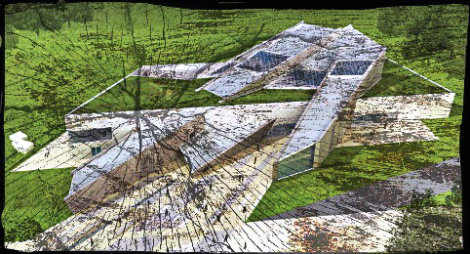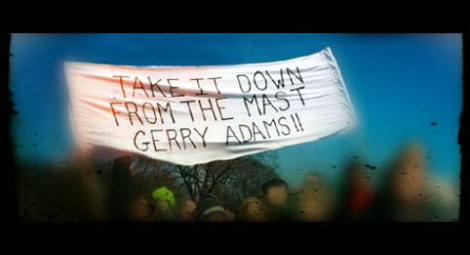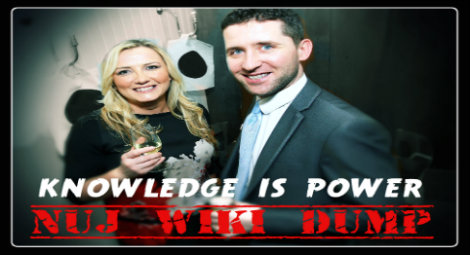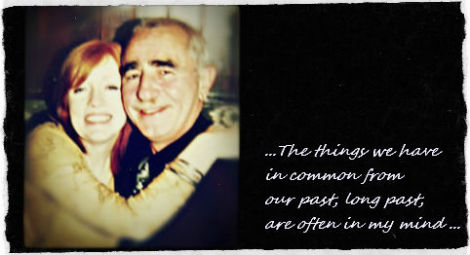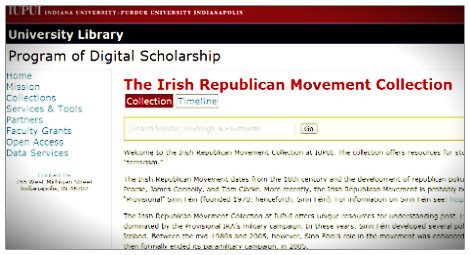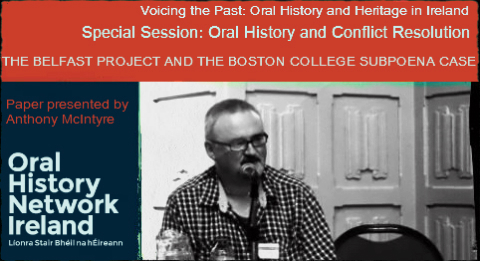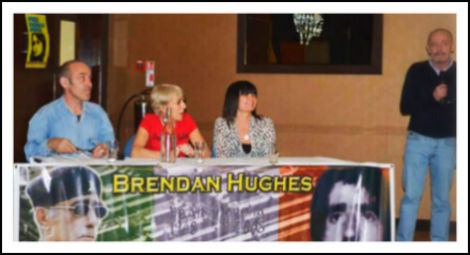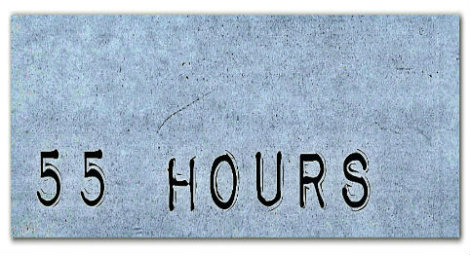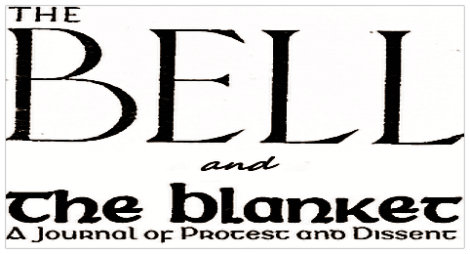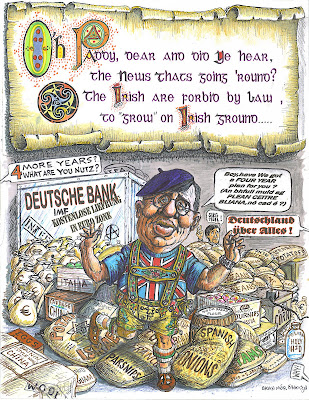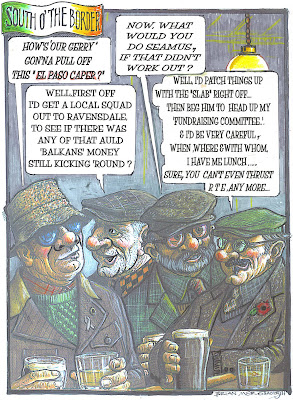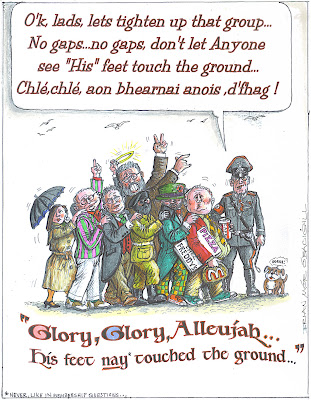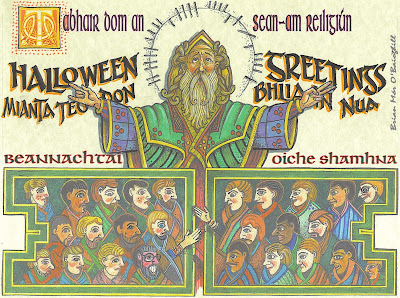
Ten years ago this month the Provisional IRA gunned down a member of the Real IRA, Joe O’Connor, in the West Belfast constituency of Gerry Adams, MP. It was a public execution designed to put manners on those deemed pretenders to the throne of Sinn Fein’s sponsored army. The organisation had just emerged on the losing side of a long war against the British state and had now accepted, through the Good Friday Agreement, the victor’s alternative to republicanism. It did not want any rival body feeding on the deficit or usurping its authority. As the writer Eamon McCann said at the time of the O’Connor killing it was an assertion by the Provisional IRA that it alone was the one true IRA and would have no false IRAs before it.
Ten years after the event it is evident just how ineffectual the Provisional IRA attempts to suppress its Real IRA rival were. This was made thunderously manifest in the recent bomb attack by the ‘Reals’ against the premises of the Ulster Bank in Derry, the home city of Martin McGuinness, Northern Ireland’s deputy First Minister. The attack acquired added spice due to Derry having been recently named UK Capital of Culture for 2013.
Today’s republican political violence is the legacy of the failure of the Provisional IRA armed struggle. A vacuum has been created which some are striving to fill with explosives. The gap between the lofty objectives of the Provisional IRA campaign and its meagre achievements is becoming increasingly difficult to paper over. The political arrangement that now exists in British Northern Ireland possesses not the slightest resemblance to the British-free united Ireland the Provisional IRA waged its war to achieve. The comments by Prime Minister David Cameron at the Tory Party annual conference that the North of Ireland is an integral part of the United Kingdom, and has political-strategic value previously thought to be lacking, is grist to the armed republican mill.
In seeking to calm political jitters the Police Service of Northern Ireland (PSNI) has released figures to underscore its claims to be coping with armed republicanism. The force has charged 59 people so far this year compared with 17 people last year. Their Garda Siochana counterparts in the Republic of Ireland have brought 22 suspected armed republicans before the courts. Yet according to the Irish Times:
security and intelligence sources estimate that there are now some 600 people linked to the dissident paramilitaries with a "small hard core" prepared to plant and detonate the bombs or carry out the gun attacks.
Perhaps more ominous for the peace is the degree of support for armed activities that appears to exist. The PSNI Derry’s commander mines the same vein of reasoning as his predecessors in the RUC did in their day when confronted by Martin McGuinness and his comrades: the ‘terrorists’ labour without either or support or legitimacy. Professor Jon Tonge casts doubt on this perspective with his survey based findings which point to a level of support substantive enough to sustain armed republicanism for some time to come. Writing in the Belfast daily, the News Letter, Professor Tonge said:
One of the mantras of the peace process is that 'dissident' republicans have no support ... Yet the assumption that dissidents have no support has been precisely that – an assumption, untroubled by actual evidence either way.
He found that 14 per cent of nationalists surveyed ‘have sympathy for the reasons why some republican groups continue to use violence.’
Today’s armed republicans are motivated to a large extent by an ideology inherited from the Provisional IRA. They employ all the tactics and discourses of the Provisionals. This has prompted the characterisation of them as ‘born again Provos’ from SDLP luminary Pat Ramsey.
This stings Sinn Fein who want no points of comparison to be drawn between the IRA it sponsored and the current crop of armed republicans. The party’s logic is weak. Martin McGuinness, a former Provisional IRA chief of staff, condemns the bombers as Neanderthals and conflict junkies determined to take Derry back to the past, forgetting in the process that it was a past he helped create. In earlier years he could be found bragging that:
we are prepared to bomb any building that will cause economic devastation and put pressure on the government. The aim of ‘our campaign is to cripple the city economically.
His party colleague, Martina Anderson, herself a former bomber, unpersuasively dismissed comparisons between today’s armed republicans and the Provisionals, arguing that it offered only ’a degree of comfort’ to those using her old methods. For her, the justification for the Provisional IRA campaign lay in structural inequality which has now been removed. Few buy into such a rationale, knowing only too well that the Provisional IRA justified its political violence on the same grounds as the Real IRA does its own. As Eamon McCann contends, ‘it's pointless demonising the dissidents as gangsters with no politics. There are clear parallels between their campaign and the Provos'. Seemingly, Sinn Fein make poor ambassadors for condemnation.
Exploiting the thread of continuity, armed republicans in directing their violence against the British state are aware that Sinn Fein gets uncomfortably trapped in the backwash. That Martin McGuinness should denounce them from the same Tory conference as David Cameron delighted the bombers. In a statement to the Sunday Tribune a Real IRA spokesperson said:
It was entirely appropriate that Martin McGuinness's condemnation of the IRA operation came from the Tory conference …The contrast between McGuinness and those still committed to the republican struggle couldn't have been greater.
And so it is likely to continue: armed republican violence more annoying to Sinn Fein than effectively subversive of British rule.
Article first published in Parliamentary Brief, 29th October













